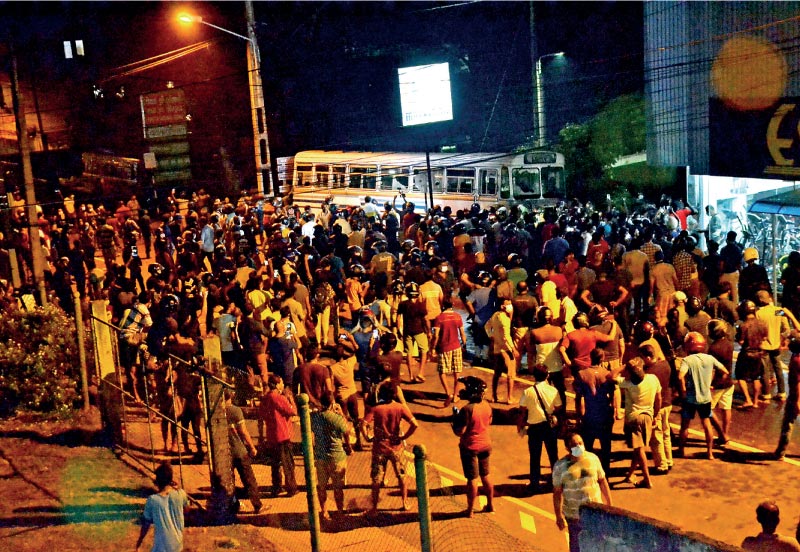Sunday Feb 15, 2026
Sunday Feb 15, 2026
Monday, 4 April 2022 01:05 - - {{hitsCtrl.values.hits}}

That President GR’s residential site in Mirihana had become a centre of agitation like the palace of Versailles in revolutionary France, is of historic significance
 The economic devastation brought about by the GR-led regime has turned excruciatingly unbearable to millions of citizens, including to those who brought that regime to power. People have lost all confidence in the Government and are not prepared to wait for another three years to see the back of it.
The economic devastation brought about by the GR-led regime has turned excruciatingly unbearable to millions of citizens, including to those who brought that regime to power. People have lost all confidence in the Government and are not prepared to wait for another three years to see the back of it.
That President GR’s residential site in Mirihana had become a centre of agitation like the palace of Versailles in revolutionary France, is of historic significance, because never in the history of Sri Lanka that an angry crowd led by no political leaders spontaneously marched to the residence of the country’s leader. That noisy agitation, perhaps infiltrated by agent provocateurs, resulted in violent confrontation against the police and military resulting in injuries, arrests and a police vehicle burnt down. That incident was symptomatic of the country descending into a period of anarchy, a situation that should be avoided at any cost at the moment.
The scheduled demonstrations to be held on 3 April have now been made impossible by the declaration of emergency in the Western Province. Whether such demonstrations would spread to other provinces is not sure. However, there are unmistakable signs of a Sri Lankan Spring bursting out soon. And like its Arab predecessor, it could end tragically in a winter of despair if those demonstrations were to turn violent. It would play into the hands of a President who had already reminded his critics in January 2021 when addressing a crowd at Uhana in Amapara, of a dark side to his character, which rooted in him while functioning as the Secretary of Defence in Mahinda Rajapaksa’s presidency.
The GR-led regime is not going to surrender to protestors so easily and will fight tooth and nail to remain in power. In fact, Tahrir Square has a clear warning to the likes of Mirihana marchers that the ancient regime could reshape itself with a military make up to govern afresh with brutal determination.
Given the strategic location of the country in the Indian Ocean international power players like India, China and the US would not wish to see anarchy in Sri Lanka. Among the three it is India that stand to lose most. India has a long record of coming to the aid of Sri Lankan governments whenever those governments faced internal threats. By keeping to that tradition, India was reported to be considering to throw another life line worth $ 1 billion to help the Rajapaksa Government to ease part of its financial difficulties.
Modi’s India, with blessing from the US, is certainly making inroads into Sri Lankan sphere of influence to checkmate rivalling China. The long-postponed dialogue with TNA that started recently was certainly because of Indian pressure. How far would that dialogue proceed and with what promises to Tamils is yet a big unknown. The fact that Muslims are not included in that dialogue is also not surprising because Modi would like them excluded. At the same time, to appease the US, the Rajapaksas are also said to be reworking on the rejected MCC deal to start with.
However, Indian inroads do bound to stir up negative reaction at least from certain quarters of the Sangha and their anti-Indian, anti-minority supremacist demagogues. Would these naysayers be rejected or controlled by a regime that came to power with their support, or, would the recalcitrant rebel against the regime, join demonstrators and add to the anarchy?
Foreign support and khaki-saffron backing at home may help the regime to continue governing for another three years, but there is no way the economy is going to bounce back as long as fundamental issues like corruption, mafia rule, nepotism, ethno-nationalism and the structural rot destroying public enterprises are tackled. It is beyond the ability and willingness of this regime to remove these evils because its political survival depends on those evils flourishing. This is why an alternative program inclusive but radical in coverage is desperately in demand.
If the Opposition fails even at this stage to form an alliance of peaceful alternative while assuring the people that it would tackle not only the immediate issue of hunger and economic misery with help from IMF, the World Bank and other international institutions, but also the more fundamental issues mentioned above, which had bedevilled this nation for decades, the immediate future of the country looks bleak. The Opposition, by jostling among themselves and without trying to find a common ground to unite and confront the common enemy, is failing the desperate citizenry. A united front with a promising rescue package would certainly swing international support to its favour. The diaspora community is also waiting for such an alternative. More than seven decades of rot must be stopped if Sri Lanka is to be saved.
(The writer is attached to the School of Business and Governance, Murdoch University, Western Australia.)